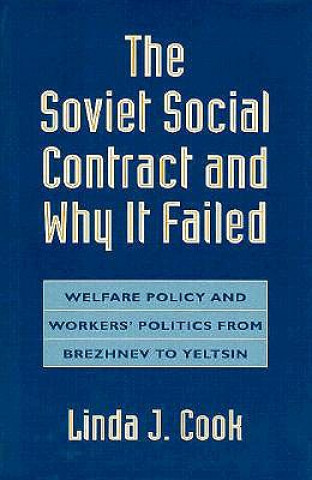
Doručení
Nákupní rádce





Nehodí se? Vůbec nevadí! U nás můžete do 30 dní vrátit
 Dárkový poukaz
V libovolné hodnotě
Dárkový poukaz
V libovolné hodnotě
S dárkovým poukazem nešlápnete vedle. Obdarovaný si za dárkový poukaz může vybrat cokoliv z naší nabídky.
Soviet Social Contract and Why It Failed
 Angličtina
Angličtina
 331 b
331 b
30 dní na vrácení zboží


As their woefully backward economy continues to crumble, much of the Soviet population remains indifferent, if not downright hostile, to the idea of reform. This phenomenon, so different from the Solidarity movement in Poland or the velvet revolution in Czechoslovakia, has been explained in terms of a "social contract" - a tacit agreement between the post-Stalin regime and the working class whereby the state provided economic and social security in return for the workers' political compliance . This book provides a critical assessment of the likelihood and implications of such a contract. Linda Cook pursues the idea from Brezhnev's day to the 1990s and considers the constraining effect it may have had on Gorbachev's attempts to liberalise the Soviet economy. In case studies on job security, retail price stability, and social service subsidies, Cook identifies points at which leaders had to make critical decisions - to commit more resources or to abandon other policies at significant cost - in order to maintain the contract. The pattern that emerges attests to the validity of the social contract thesis for the Brezhnev period. At the same time, Cook's analysis points to several important factors, such as the uneven distribution of benefits, that help explain why labour unrest and activism have varied dramatically from sector to sector in recent years. Ultimately, these case studies reveal, particularly for the Gorbachev period, deep conflicts between the old contract and the requisites of economic reform. Cook extends her analysis into the Yeltsin period to show how the democratising state dealt weakly with labour's demands, seeking to stabilise labour relations with an inappropriate corporate structure. In the end, mobilised labour contributed greatly to the pressures that undermined Gorbachev's regime, and remained an obstacle to economic reform through the early months of Yeltsin's Russia.
Informace o knize
 Angličtina
Angličtina
Kategorie




 Jak nakupovat
Jak nakupovat















